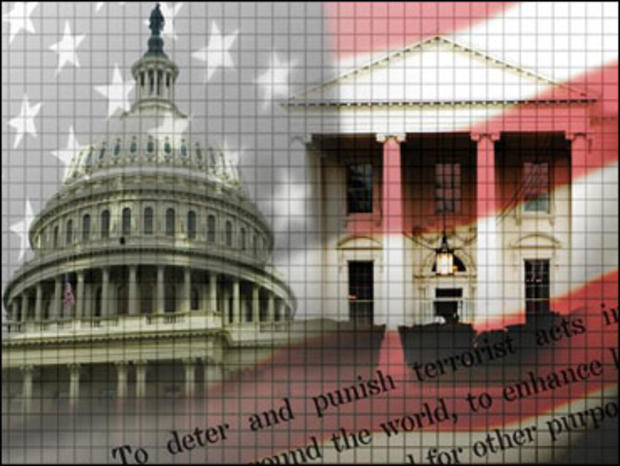Senate moves forward with Patriot Act extension
Senate Majority Leader Harry Reid announced Tuesday evening that the Senate is moving forward with a vote to extend certain provisions of the Patriot Act, without any votes on amendments -- whether certain Republicans and Democrats like it or not.
"I'm not at the luxury of waiting for a better time," Reid said on the Senate floor. "We cannot let the Patriot Act expire. I have a responsibility to try to get this bill done as soon as possible."
Certain provisions of the Patriot Act -- the controversial law passed after 9/11 that expanded the government's authority to conduct surveillance in the U.S. -- expire at midnight on Thursday if an extension isn't passed. Some Democrats and Republicans seized the looming vote as a chance to change the Patriot Act.
Sen. Patrick Leahy, D-Vt., who co-sponsored an amendment to the bill with freshman Sen. Rand Paul, pointed out on the Senate floor today that the expiring provisions haven't been refined since 2006. The current legislation would extend them for another four years, which "will amount to nine years without legislative improvement," Leahy said. "I know that we can do better."
Even though the three provisions set to expire relate to some of the controversial aspects of the Patriot Act that legislators sought to change, the Obama administration and some top Democrats said they strongly supported the legislation to extend them. The administration said in a statement this week that "it is essential to avoid any hiatus in these critical authorities."
The three provisions in question are referred to as the "business records" provision, the "roving wiretaps" provision and the "lone wolf" provision. The first allows the government to obtain access for anything it calls relevant to a terror investigation. The "roving wiretaps" provision gives the government power to monitor any communications facility, such as phone numbers or email accounts, believed to be in use by a subject under surveillance. The "lone wolf" provision allows the government to track foreign terrorism suspects even if they have no known connection to a terrorist group.
Paul, the Kentucky GOP freshman and son of Rep. Ron Paul, had nearly a dozen amendments he intended to introduce, and he signaled to Senate leaders this week he would hold up the vote to extend those expiring provisions unless his amendments were put up for vote. Reid said today he tried but failed to reach a compromise with Paul. He said the bill in its current state was good enough to pass.
"Is this a bill everybody in the Senate or everybody in the House likes? The answer is no. But we all know how important it is," Reid said.
Critics of the administration noted this week that President Obama and Democrats in the Senate seem to have reversed course on the Patriot Act now that they are in power.
"When George W. Bush was president, the Patriot Act became part of the liberal conspiracy theory that Republicans were engaged in a lawless crusade to turn the U.S. into a police state," the Wall Street Journal wrote in an editorial Tuesday praising the administration's embrace of the surveillance provisions. "But the Patriot Act can now join Guantanamo, military commissions, unlimited detention, drone strikes, the state secrets doctrine and Middle Eastern democracy as Bush policies that Mr. Obama has embraced one way or another."
Indeed, some of the amendments Paul put forward addressed the very same issues that Mr. Obama and some of his colleagues in the Senate, both Democrat and Republican, raised under the Bush administration.
For instance, one amendment -- introduced by Democrat Mark Udall, of Colorado and co-sponsored by Paul -- would restrict "roving" wiretaps so that government agencies would be required to "ascertain the presence of the target of a roving wiretap before beginning surveillance of a particular phone or email, using the same standard that is already required for criminal roving taps," according to Paul's office.
In a 2005 "dear colleague" letter, then-Sen. Obama argued that "An ascertainment requirement, as has long applied to roving criminal wiretaps, is needed to protect innocent Americans from unnecessary surveillance, especially when a public phone or computer is wiretapped." He and the other senators who signed the letter called roving wiretaps "a sweeping power never authorized in any context by Congress before the Patriot Act."
On the Senate floor Tuesday, Democratic Sen. Ron Wyden of Oregon criticized the Obama administration -- not for its support of the powers granted by the Patriot Act, but for its refusal to explain that support. Wyden said he was supporting an amendment that would have required the administration to make public its interpretation of the Patriot Act.
The senator said that the American people understand that some security operations must be kept secret, but "they don't believe the government ought to be writing secret law... It violates the trust Americans place in their government."
